MRRL Hall of Fame
MARVELETTES
- Details
- Category: Inductees
- Created: Friday, 30 September 2011 08:11
- Written by Gary Johnson
Although they have been overshadowed by the Supremes and Martha and The Vandellas, the Marvelettes were the first important girl group at Motown and the first act on the label to have a # 1 single.
All of the girls in the group attended the same high school in Inkster, Michigan, where they sang in the school glee club. Group founder Gladys Horton had been orphaned at the age of nine months. She spent her young life living in a succession of foster homes without ever being permanently adopted by any of the families that cared for her. Gladys sang in the church choir before joining the glee club.
Horton was just 15 years-old when she brought school friends and fellow glee club members Katherine Anderson, Juanita Cowart, and Georgeanna Tillman together to prepare for a talent show at Inkster High. First prize was an audition at Motown. Gladys also recruited Inkster graduate Georgia Dobbins for the group because of her experience performing with other singing groups in the area.
While trying to come up with a name for their new group, the girls broke out laughing when one of them jokingly commented that “we can’t sing yet”. They all decided that a contraction of the joke, Casinyets, would be a great name for their group, and they began to build their talent contest repertoire.
The Casinyets practiced songs by the Chantels and the Shirelles but chose to perform an original song by Dobbins at the show. They finished a disappointing fourth in the competition. Two of their teachers, however, were very impressed by the girls’ performance and presentation and prevailed upon the school principal to allow the group to sing for Motown representative John O’Den. 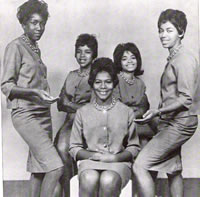 The Casinyets
The Casinyets
This led to an audition for the Casinyets at Motown for producers Robert Bateman and Brian Holland in April of 1961. Wearing matching red and black outfits, the girls performed a trio of hits by the popular girl groups of the day.
After Bateman and Holland told the Casinyets to come back with some original material, Georgia Dobbins contacted a friend named William Garrett who was a songwriter. Garrett had written a blues song that had a title that captured Georgia’s imagination.
Dobbins then restructured Garrett’s “Please Mr. Postman” into an upbeat pop song and convinced Gladys Horton to sing lead on the number. Georgia had by this time decided to leave the group to care for her ailing mother. Dobbins felt it was only right to leave the group before they signed with Motown rather than abandon them after they started to record. Horton quickly found a replacement in another recent Inkster grad named Wanda Young, and the group returned to Motown in May with their new song.
Motown loved “Please Mr. Postman”, and the girls went into the studio to record it later that month. A 22-year-old Marvin Gaye was the drummer on the session for their recording debut. Before “Please Mr. Postman” was issued, however, Berry Gordy Jr. wanted the girls to change the name of their group. He felt that Casinyets was too hard to pronounce. 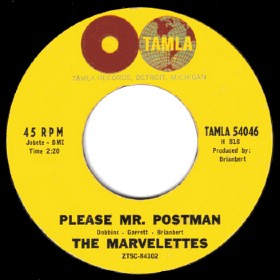 Motown's first # 1 hit of the Hot 100
Motown's first # 1 hit of the Hot 100
He finally decided to name them the Marvelettes and the record, released on the Tamla label, began its long climb to the top of the charts. “Please Mr. Postman” eventually spent one week at # 1 on Billboard’s Hot 100 and seven weeks at the top of Billboard’s R&B charts in the fall of 1961.
When “Please Mr. Postman” hit, most of the Marvelettes were still attending Inkster High. They performed at Detroit-area record hops and teenage dance parties with radio deejays while attending classes five days a week.
In the meantime, Motown was setting up the label’s first national theatre tour featuring the Miracles, Mary Wells, Marv Johnson, and other early Motown artists. Many in the audiences at these Motor City Revues came expecting to also see the Marvelettes perform their # 1 hit and would begin chanting the name of the group when they did not appear.
The chanting became so persistent at the shows that Berry Gordy sent for the Marvelettes to join the tour as soon as possible. The girls decided to leave school at this time, and they were permitted to go with the understanding that they would be tutored while on tour. Since they were minors and Gladys was an orphaned ward of the courts, Esther Gordy (Berry’s sister) became their legal guardian and accompanied the Marvelettes on their first tour of the East Coast theatre circuit. Motown, however, did not supply the promised tutors for the girls. 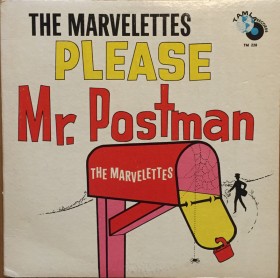 "Please Mr. Postman" album
"Please Mr. Postman" album
Motown quickly assembled the Marvelettes’ first album, “Please Mr. Postman”, to take advantage of the hit single. The cover of the LP was a cartoonish rendering of a mailbox and did not feature a photo of the group. Motown designed many of its early albums in this way because they believed that most record stores at this time would not prominently display albums that featured pictures of black artists.
The Marvelettes released their second single, “Twistin’ Postman” early in 1962. The new record tried to cash in on both the girls’ hit single and the current “twist” dance sensation. It peaked at # 34 on the Hot 100 and # 13 on the R&B charts.
The Marvelettes’ next single, “Playboy”, was conceived by Gladys Horton at her home in Inkster. But when the single was released in the spring of 1962, Gladys was not listed as one of the songwriters by Motown. “Playboy” was a big hit, peaking at # 7 on the Hot 100 and # 4 on the R&B charts.
Their follow-up, “Beechwood 4-5789” was written by Marvin Gaye especially for the group. The single reached # 17 on the Hot 100 and was a two-sided hit on the R&B charts. “Beechwood 4-5789” was a # 7 R&B hit and its B-side, the charming “Someday, Someway”, reached # 8. 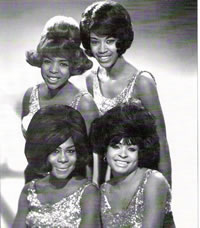 (Top) Georgeanna Tillman, Katherine Anderson (Bottom) Gladys Horton, Wanda Young
(Top) Georgeanna Tillman, Katherine Anderson (Bottom) Gladys Horton, Wanda Young
The girls’ next single, a ballad called “Strange I Know”, was released near the end of 1962 and only charted # 49 on the Hot 100 although it was a Top Ten R&B hit.
Early in 1963, Juanita Cowart quit the group reducing them to a quartet. Juanita found the touring conditions, in which black artists were often not allowed to stay in some of the bigger name hotels and were forced to stay in guesthouses, intolerable. She also found it very difficult to travel on long trips to shows in crowded buses or station wagons where there was little room to sleep or move about.
“Locking Up My Heart” was one of the earliest productions of the famed Holland-Dozier-Holland team in 1963. It featured shared lead vocals by Gladys Horton and Wanda Young, but it only reached # 44 on the Hot 100, and it was the Marvelettes’ lowest charting R&B single yet as it peaked at # 25.
Berry Gordy then took over the songwriting duties for the follow-up single, “My Daddy Knows Best”, but the Marvelettes’ chart slump continued as it only reached # 67 in the summer of 1963. Even Bill ‘Smokey’ Robinson’s magic touch couldn’t turn things around for the Marvelettes as their recording of his “As Long As I Know He’s Mine” only reached # 55 on the Hot 100.
Motown tried an experiment with Gladys Horton around this time by mimicking a Phil Spector production on the song “Too Hurt To Cry, Too Much In Love To Say Goodbye”. Gladys’ voice was double-tracked and the instrumental backing imitated Spector’s “Wall of Sound”. The background vocals were supplied by Motown’s crack female studio group, the Andantes. Motown released the single under the moniker of the Darnells to see if it could be a hit under another girl group’s name. Even though many fans recognized Gladys’ distinctive voice, the interesting attempt at something a little different failed to chart.
Smokey’s next two productions for the Marvelettes also failed to break into the Top 40 as “He’s A Good Guy (Yes He Is)” peaked at # 55 and “You’re My Remedy” reached # 48. “You’re My Remedy” is significant in that it was the first Marvelettes’ A-side to feature Wanda Young as the sole lead vocalist. 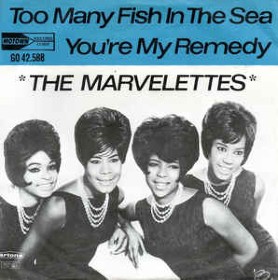
In need of a new hit single, the Marvelettes made a song choice that changed both the course of Motown as a company and the career of the Supremes. Holland-Dozier-Holland had written a song for the Marvelettes called “Where Did Our Love Go”. They had even cut a backing track in a sympathetic key, but the girls turned it down in favor of a Norman Whitfield and Eddie Holland song called “Too Many Fish In The Sea”.
“Where Did Our Love Go” was instead given to the Supremes, and it became the first of twelve # 1 hits for what became Motown’s most popular girl group. The incredible success of the Supremes provided Berry Gordy with the kind of crossover act that helped make Motown a household word around the world.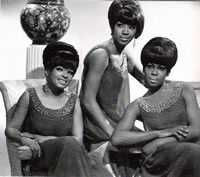 Wanda Rogers, Katherine Anderson, Gladys Horton
Wanda Rogers, Katherine Anderson, Gladys Horton
“Too Many Fish In The Sea” did become sizeable hit for the Marvelettes as it reached # 25 on the Hot 100 in early 1965. It was also significant in that it was the last Marvelettes’ hit to feature the lead vocals of Gladys Horton.
By this time, Wanda Young had married Bobby Rogers of the Miracles and Smokey had begun to write songs for the Marvelettes with Wanda’s lead vocals in mind.
Another significant change occurred when Georgeanna Tillman departed after she married the Contours’ Billy Gordon. Georgeanna really left the Marvelettes, however, for medical reasons. She was diagnosed with lupus, and her doctors advised her to discontinue her career. Tillman would die of lupus in 1980.
Now a trio with Wanda Young as the lead singer, the Marvelettes had a Top 40 hit in the summer of 1965 with Smokey’s “I’ll Keep Holding On”. The follow-up single was written by Clarence Paul, Ivy Jo Hunter, and Mickey Stevenson. “Danger Heartbreak Straight Ahead” was one of those great Motown records that seemed to slip through the cracks, as it managed to peak at only # 61 on the Hot 100. 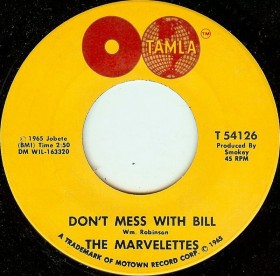
Smokey Robinson was back with the group, however, for their biggest hit single in almost four years, “Don’t Mess With Bill”. Smokey is not the “Bill” in the song. He chose the name because it sang well, and the song turned out to be a perfect vehicle for Wanda Young’s vocal style. “Don’t Mess With Bill” reached # 7 on the Hot 100 and # 3 on the R&B charts early in 1966.
The Marvelettes’ recording of Robinson’s “You’re The One” failed to make the Top 40, but they started 1967 off on the right foot with another one of his songs, “The Hunter Gets Captured By the Game”. Smokey had to fight to get Motown to release the single. Many at the label felt that the song was a little too jazz-influenced for the Marvelettes, but Smokey believed in the song and its # 13 showing on the Hot 100 as well as its # 2 position on the R&B charts proved the doubters wrong. The Marvelettes took their next hit single from “The Hunter Gets Captured By the Game” LP. It was a cover of Ruby & the Romantics’ 1964 hit, “When You’re Young And In Love”. The Marvelettes’ version peaked at # 23 on the Hot 100 and # 9 on the R&B charts.
Smokey Robinson recruited Melvin Franklin from the Temptations to sing the deep-voiced introduction to the Marvelettes’ 1967 single, “My Baby Must Be A Magician”. The record was a sizeable hit, reaching # 17 on the Hot 100 and # 8 on the R&B charts, but both Smokey and the Marvelettes thought it was going to be a bigger seller than it was.
The song would be the last big hit for the group, and it would signal the departure of founding member Gladys Horton. Gladys had fallen in love with a trumpet player from Joe Tex’s band, and he had started traveling with the Marvelettes. He was jealous that Gladys was in the spotlight, and she left the group following their marriage. Gladys gave birth to a son who was born handicapped, and she raised him and the rest of her family as a single parent after the marriage ended.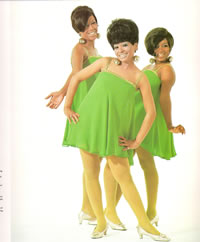 Katherine Anderson, Wanda Rogers, Ann Bogan
Katherine Anderson, Wanda Rogers, Ann Bogan
Gladys was difficult to replace, but eventually Harvey Fuqua brought in Anne Bogan. After an audition, Bogan was accepted as an able replacement for Horton. Despite their newest addition, the end of the Marvelettes was drawing near. They charted four more songs in the Hot 100 before eventually calling it quits at the end of 1969.
Smokey Robinson’s “Here I Am Baby” would be his last charting production for the group during the summer of 1968. Later that year, the Marvelettes recorded “Destination Anywhere”, a song written and produced by the team of Nick Ashford and Valerie Simpson but it only reached # 63.
The girl group era was drawing to a close by 1969, and their last two singles of that year, “I’m Gonna Hold On As Long As I Can” featuring Anne Bogan on lead vocals and a cover of Baby Washington’s “That’s How Heartaches Are Made” also failed to crack the Top 40.
Internal problems between Wanda Young and the other two Marvelettes put the final nail in the coffin for the group. Katherine Anderson left the group completely disillusioned. After a couple of years of spiritual meditation, she was able to finally come to terms with the unpleasant way the Marvelettes ended. She never sang again professionally after leaving the group and has been very active over the years with a leadership role in the Girl Scouts.
Anne Bogan signed on as a singer for the vocal group portion of New Birth. Although Bogan eventually left in 1973, the group continued to have a great deal of chart success on the RCA label.
Smokey Robinson produced an album for a Wanda Young solo project in 1970, but Motown decided to call the album “The Return Of The Marvelettes” instead because of the group’s commercial name value. Wanda was the only Marvelette who appeared on the album and the backing vocals were done entirely by the Andantes. When Motown moved to the West Coast, Wanda Young decided to stay in Detroit. She is in ill health today, the result of years of drug and alcohol addiction.
Gladys Horton attempted to reunite the original group during the 1980’s, but the other members were unwilling or unable to participate. She toured with several different backing singers during the decade as the “Original Marvelettes”. 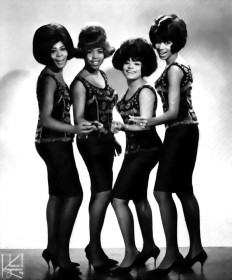 The Marvelettes
The Marvelettes
In recent years Gladys has expressed bitterness over the way she felt the Marvelettes were treated at Motown. It is her opinion that the group was looked down on at Motown because they were from Inkster instead of Detroit. Gladys also felt that the Marvelettes were forced to take a back seat while the label promoted the Supremes and Diana Ross.
Unfortunately, the name Marvelettes was allowed by Motown to be purchased by a promoter who has groups of younger female singers performing across the country as “The Marvelettes”. These fake groups appear talking about and performing “our big hits” while Gladys Horton is unable to use the name of the group she founded.
In 2006, Mary Wilson of the Supremes and others such as Jon “Bowser” Bauman of Sha Na Na helped launch a bill aimed at preventing artists from using the name of a group that does not have at least one original member. Called the “Truth In Music Bill", its passage in Michigan and 26 other states has helped cancel the trademark registrations of these bogus groups. The imposter Marvelettes can no longer claim to be the real thing and can now only perform as a 'Tribute to the Marvelettes'. The bill also allowed Gladys Horton and Katherine Anderson to apply for the trademark that would allow them to again use the name "Marvelettes" in the future.
In retrospect, it seems as if the Marvelettes have never completely been given the recognition they deserve as girl group trailblazers at Motown. Besides being the first artists on one of the Motown labels to have a # 1 single, they were also the first Motown act to chart three Top 20 hits on the Hot 100. “Please Mr. Postman” was one of the earliest Motown songs covered by the Beatles, and the Marvelettes, along with the Miracles and Mary Wells, were the biggest stars of Motown’s formative years.
Although they have yet to be inducted into the Rock and Roll Hall of Fame, they were voted into the Vocal Group Hall of Fame in 2004. That same year, the group finally received a gold record for their first big hit “Please Mr. Postman” at a special ceremony at Inkster High. Since Motown did not report record sales to the RIAA (Record Industry Association of America) which certifies gold records, the group had to wait over forty years for their award.
In 2007, the Marvelettes were voted into Michigan Rock and Roll Legends Hall of Fame. "Please Mr. Postman" was voted a Legendary Michigan Song in 2010. Gladys Horton, the original lead singer of the Marvelettes, died in Calfornia at the age of 66 on January 26, 2011, following a stroke. Wanda Young, the final lead singer of the group, passed away on December 15, 2021.
MRRL Hall of Fame: https://www.michiganrockandrolllegends.com/mrrl-hall-of-fame
Video: Watch a video of The Marvelettes performing "Don't Mess With Bill" https://www.youtube.com/watch?v=OVsW_6AomOQ
Dr. J. Recommends:
“Marvelettes: The Ultimate Collection”. Motown, CD. This excellent CD has 25 songs and is a great collection for any fan of the Marvelettes. 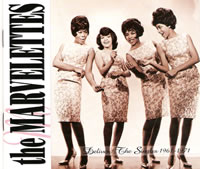
“The Marvelettes Deliver: The Singles 1961 -1971”. Motown, 2 CD. This is the one you want if you are a major fan. The 41 songs contain all the hits plus some interesting B-sides, non-hits, and the Darnells’ single.
From the Bookshelf:
The Original Marvelettes – Motown’s Mystery Girl Group by Marc Taylor, Aloiv Publishing Co. 2004
I recommend this book with some reservations. The author bases the book almost entirely on interviews with original member Katherine Anderson. Gladys Horton declined to participate because she was planning to write her own book on the Marvelettes, and Wanda Young was reportedly in poor health and not in any condition to be involved in the project. It’s somewhat flawed because it does not contain insights from the group’s two lead singers, but it’s better than no book on the Marvelettes, and it has helped to give Motown’s first important girl group some belated recognition.
